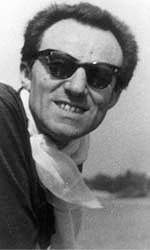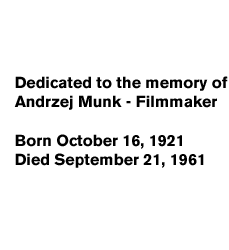

A short excerpt from the booklet essay by Dr César Ballester.
With Eroica, Munk joins what can be considered the main theme of the Polish Film School: the trauma of war and death, the common experience which “had been suppressed or distorted” by the communist authorities. The trauma that causes the disappointment in the values and the national tradition inherited from the 19th Century and inculcated to this generation of directors during the interwar Polish Republic. This tradition had already been questioned during the 19th Century itself (by the writers referred to as ‘realists’, who believed in conciliation or ugoda, and also by the positivist and ‘Young Poland’ writers), and at the beginning of the 20th Century, by among others, Stefan Żeromski.
In the words of Munk himself, “in a time when the traditional Polish heroism, romantic and individualist, had been transformed into a new, almost unknown, type of heroism – a social heroism, heroism directed by reason.” It is not fully clear what Munk means by ‘social heroism’, but indeed what is clear is that the new heroism commences now from reason, that is, a heroism that learns from experience, that corrects errors and past behaviours. It is the conscience of the necessity for a radical change.
Eroica pretended, like the rest of the contemporary films belonging to the so-called 'Polish Film School', to generate a debate, “not to attack the pure heroism” but “the useless one” and “inspire people to consider these aspects […] showing examples of traditional behaviour and its tragic consequences.” And this can be applied both to Munk and to Wajda. The differences among themselves are more of form rather than content. Yes, Munk uses irony in the first part of Eroica, and in his next film Bad Luck (Zezowate szczęście, 1960), but in both the disillusion is the same. In fact, both directors work with the same scriptwriter, Jerzy Stefan Stawiński, to analyse the uprising of 1944. Wajda does it in Kanał, Munk in Eroica.
Eroica based upon two of Stawiński's short stories, Węgrzy (The Hungarians) and Ucieczka (The Escape), and these in turn on real events. Stawiński took part in the uprising, and had to cross Warsaw using the sewer system. If in anything these directors differ it is in the question they are posing. Both question traditional heroism, but Wajda within the context of the question “who are we as Poles?” Munk on the other hand, asks himself “who am I as a Pole?” Wajda addresses and analyses the collective, Munk the individual. In Eroica, Munk was “attracted by the problematic of heroism, by the solitude of an individual lost in a crowd, and by the solitude of an army official who is hidden.”
Dr. César Ballester’s complete essay, from which this excerpt is taken, appears in the booklet which accompanies the DVD release.
Essay
A short excerpt from the booklet
DVD Reviews
DVD Beaver by Gary W. Tooze
Mondo Digital by Nathaniel Thompson
Sight & Sound by Geoffrey Macnab
Time Out by Tom Huddleston
Cine-Vue by Daniel Green
The Quietus by Manish Agarwal
CineOutsider by Michael Ewins
Film Reviews
Village Voice
Strictly Film School
Film Reference.com
Connections
(i) Andrzej Munk at Culture of Poland website
(ii) Munk at Kinoblog
(iii) Andrzej Munk retrospective at the Melbourne Cinematheque
(iv) The Polish Resistance in WW2
(v) Polish Cultural Institute